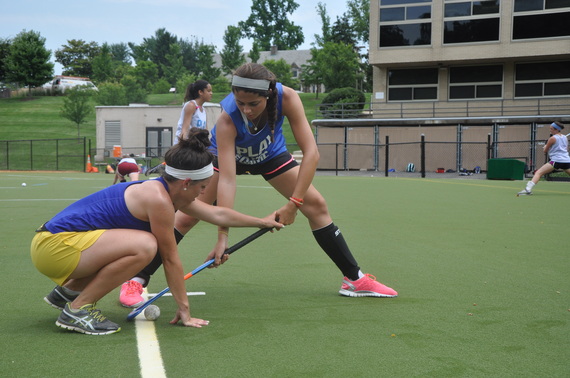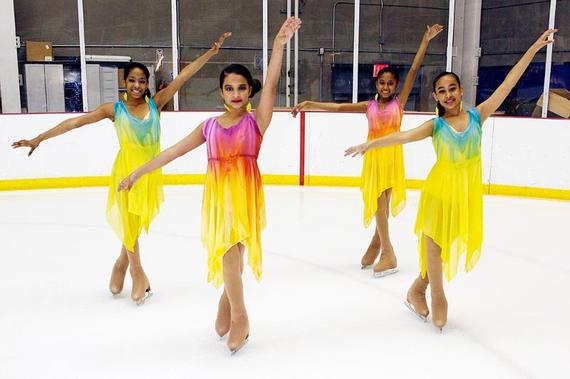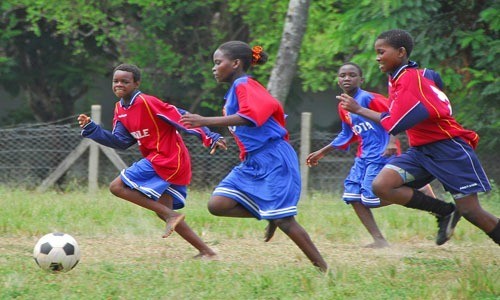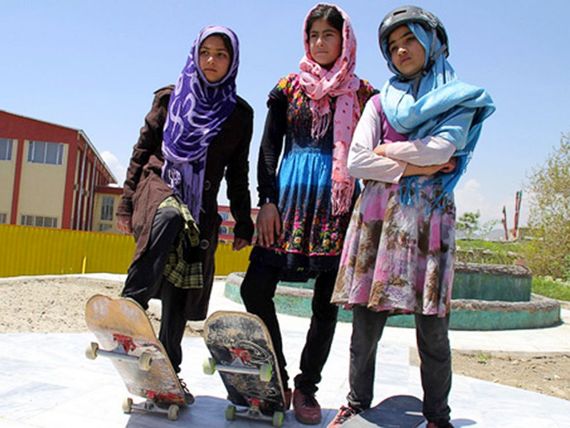It's summer time now and school's out. It seems like every park I pass has an organized group of kids engaged in some kind of sport. I realized recently that when I was a kid, there would have been a lot more groups of only boys. Now I see both girls and boys and know what a positive change this is. Kids learn so much from participating in group sport activities, I'm glad that it has become the norm to offer those learning opportunities to girls as well as boys.
In the U.S. in 1972 they passed Title IX, which says, among many other things, that there can't be gender discrimination in any educational program that receives federal funding. Girls and boys need to be offered the same opportunities. There have been many different court cases arguing what this means. And there has been a lot of research following up on the effects this has had. Betsey Stevenson, an economist at the Wharton School of the University of Pennsylvania showed that increasing girls' sports participation had a direct effect on women's education and employment. "It's not just that the people who are going to do well in life play sports, but that sports help people do better in life." Dr. Stevenson's research also shows that women who play sports are more likely to enter a male-dominated field and more likely to make more money than their non-athletic female counterparts. 
Chrissy Summers read doctor Stevenson's research and was strongly inspired. Since she was already the kind of woman who had once written a love poem to her hockey stick, she started Beyond Sticks. They start with hockey, but their real mission is the belief that "success comes when athletes are able to translate these skills into other areas of life." They incorporate "Play Beyond the Game" sessions where the girls are specifically taught to take the skills they learn and expand the ideas for use in other aspects of their lives. "When you get beyond the technical aspects, sports are about ingraining confidence, hard work, focus, and goal setting (among a myriad of others) into young people's personalities early. When I see these areas develop in the people I coach, it is infinitely more rewarding than watching them perfect any hockey skill."
The approach of Figure Skating in Harlem (FSH) is the same. Their mission is "to transform young lives and help underserved girls grow in confidence, leadership, and academic achievement." They just happen to do it through figure skating. FSH was founded in 1997 by Sharon Cohen, a gold medalist in figures, freestyle, and a ice dancing. After a chance encounter with a group of girls from East Harlem who wanted to learn to figure skate, she knew this could be her opportunity to pass on the lessons in discipline, perseverance, responsibility and goal setting that she had herself had learned. The skating is important, but the other skills actually get the priority. Skaters in the program are asked to sign a 'skater's contract' requiring them to maintain a B+ average in school. The program offers a wide variety of off-ice classes in subjects from communication and literacy skills to lessons in money management to good health and proper nutrition. "Our students have demonstrated higher grades in school, better attitudes, greater physical coordination, improved concentration, and most important, they have reported increased feelings of personal accomplishment and self-worth. This is perhaps why the vast majority of our students keep coming back year after year."
It isn't just here in the US that educators are seeing the benefits of sports as a way to teach life skills. Based in the Netherlands, Women Win works with 32 organizations in 20 countries around the world. Women Win uses sport as a strategy to advance girls' rights by addressing gender-violence, reproductive health, and strategies for economic empowerment. They have consulted experts and combined that with their own experiences to assemble a guideline for designing sports programs for girls, which they have released under Creative Commons licensing so anyone can have free access to their findings. Their website features many fascinating stories about how joining sports groups changed the lives and opportunities for many young women in different countries.
I think the most startling group I found was Skateistan. The project started in 2007 when Australian skateboarder Oliver Percovich dropped his board in Kabul. He was suddenly surrounded by kids wanting to know what it was and how it worked. In 2009 the Afghan National Olympic Committee donated 5428 square meters of land for an an all-inclusive skatepark and educational facility. They welcome children 5-18; 50% of their participants are street children, and 40% of their skaters are girls. In fact, they believe their skateboarding group is the largest female sporting organization in Afghanistan. They have spread their success and are now an international NGO with projects in Cambodia and South Africa as well as Afghanistan. Once the children are invited in to participate with the skateboards, the skateparks has classrooms where they offer a wide variety of classes, again focusing on life-quality skills that will enable the children to work towards a better future.
Educating girls isn't just about book skills. Part of it needs to be about teaching them the confidence to compete with men and the concentration and leadership skills they need to do well in a competitive environment. The many innovative approaches we see that give girls what they need to succeed are definitely cause for celebration.
